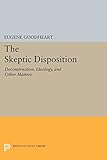The Skeptic Disposition : Deconstruction, Ideology, and Other Matters / Eugene Goodheart.
Material type: TextSeries: Princeton Legacy Library ; 1210Publisher: Princeton, NJ : Princeton University Press, [2014]Copyright date: ©1991Edition: Course BookDescription: 1 online resource (222 p.)Content type:
TextSeries: Princeton Legacy Library ; 1210Publisher: Princeton, NJ : Princeton University Press, [2014]Copyright date: ©1991Edition: Course BookDescription: 1 online resource (222 p.)Content type: - 9780691600826
- 9781400862238
- 801/.95 20
- PN98.D43
- online - DeGruyter
- Issued also in print.
| Item type | Current library | Call number | URL | Status | Notes | Barcode | |
|---|---|---|---|---|---|---|---|
 eBook
eBook
|
Biblioteca "Angelicum" Pont. Univ. S.Tommaso d'Aquino Nuvola online | online - DeGruyter (Browse shelf(Opens below)) | Online access | Not for loan (Accesso limitato) | Accesso per gli utenti autorizzati / Access for authorized users | (dgr)9781400862238 |
Browsing Biblioteca "Angelicum" Pont. Univ. S.Tommaso d'Aquino shelves, Shelving location: Nuvola online Close shelf browser (Hides shelf browser)

|

|

|

|

|

|

|
||
| online - DeGruyter The Epistolary Moment : The Poetics of the Eighteenth-Century Verse Epistle / | online - DeGruyter Aestheticism and Deconstruction : Pater, Derrida, and de Man / | online - DeGruyter Neverending Stories : Toward a Critical Narratology / | online - DeGruyter The Skeptic Disposition : Deconstruction, Ideology, and Other Matters / | online - DeGruyter Stevens and the Interpersonal / | online - DeGruyter Practicing Romance : Narrative Form and Cultural Engagement in Hawthorne's Fiction / | online - DeGruyter Imagining Language in America : From the Revolution to the Civil War / |
Frontmatter -- CONTENTS -- ACKNOWLEDGMENTS -- INTRODUCTION -- 1. Criticism at the Present Time -- 2. The Transcendental Site: From Heaven to Earth -- 3. Roland Barthes and the Monster of Totality -- 4. Reading with/out a Text -- 5. Discourse without Foundation -- 6. A Question of Meaning -- 7. Literature as Play -- CONCLUSION: Deconstruction and Social Criticism -- AFTERWORD -- INDEX -- Backmatter
restricted access online access with authorization star
http://purl.org/coar/access_right/c_16ec
Eugene Goodheart examines the skeptic disposition that has informed advanced literary discourse over the past generation, arguing that the targets of deconstructive suspicion are fundamental humanistic values. "[This book] is a fair-minded, generous critique of the deconstructionist theories of Jacques Derrida, Paul de Man, and their followers. These writers have argued that language is so inherently slippery it can never express a speaker's intended meaning. The critic's role, in their view, is to explore the contradictions, subtexts, and metaphorical byways of works that may be most radically deceptive when they appear simple. Critics have castigated this language-centered skepticism as a form of nihilism geared to multiply numbingly similar readings of already familiar texts. Mr. Goodheart's objection is more subtle. He suggests that the philosophical orientation of deconstructive critics leads them to overemphasize the tricky propositional sense of words at the expense of the broader impact of literature--its power to wound, thrill, or transform us."--Morris Dickstein, The New York Times Book ReviewOriginally published in 1991.The Princeton Legacy Library uses the latest print-on-demand technology to again make available previously out-of-print books from the distinguished backlist of Princeton University Press. These editions preserve the original texts of these important books while presenting them in durable paperback and hardcover editions. The goal of the Princeton Legacy Library is to vastly increase access to the rich scholarly heritage found in the thousands of books published by Princeton University Press since its founding in 1905.
Issued also in print.
Mode of access: Internet via World Wide Web.
In English.
Description based on online resource; title from PDF title page (publisher's Web site, viewed 30. Aug 2021)


